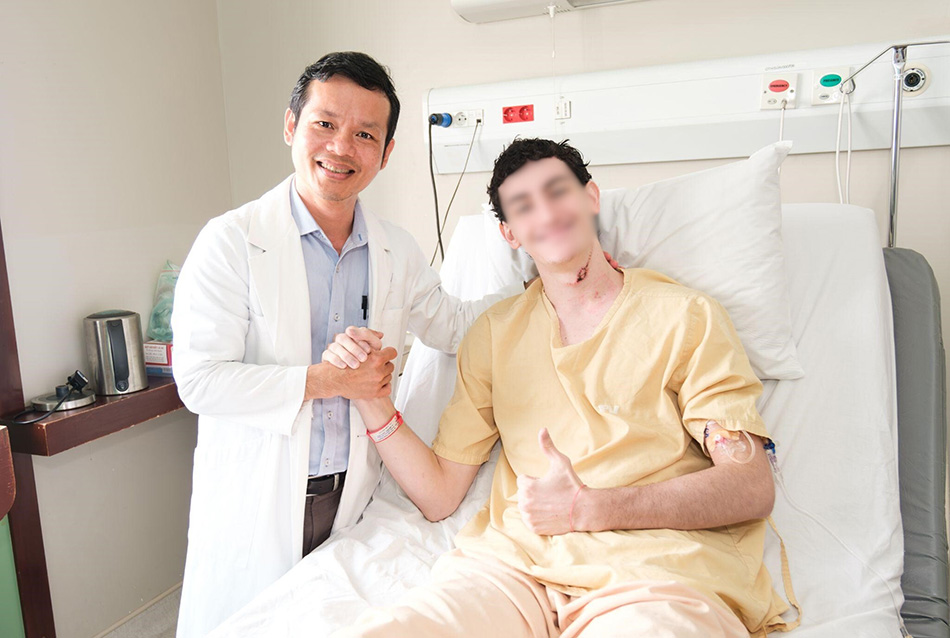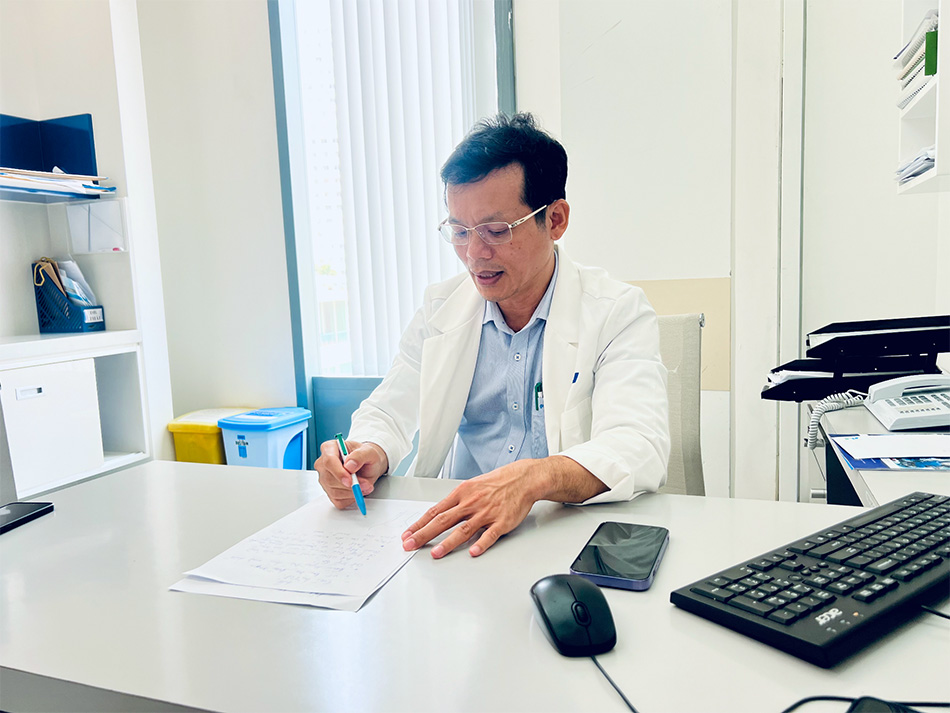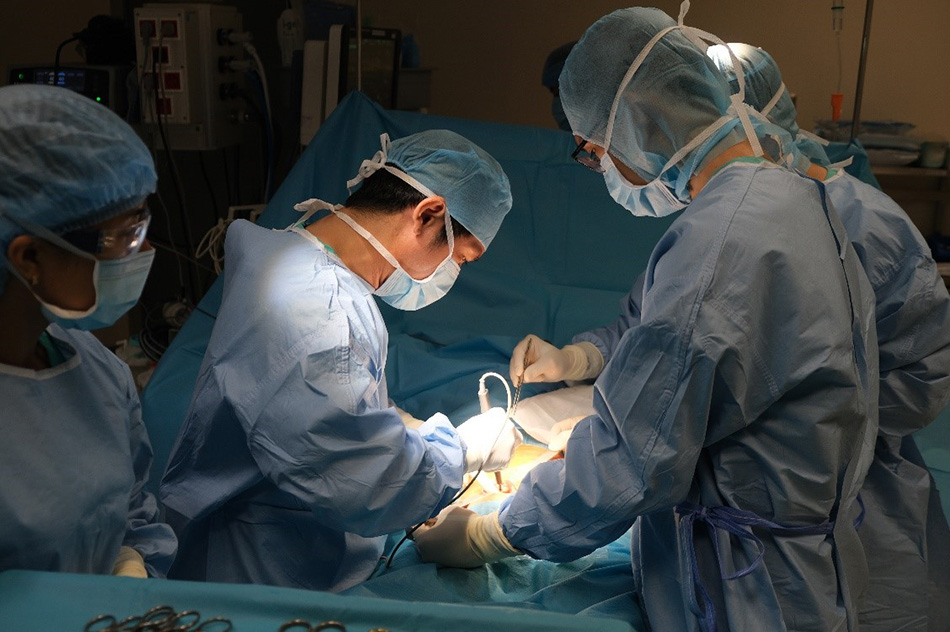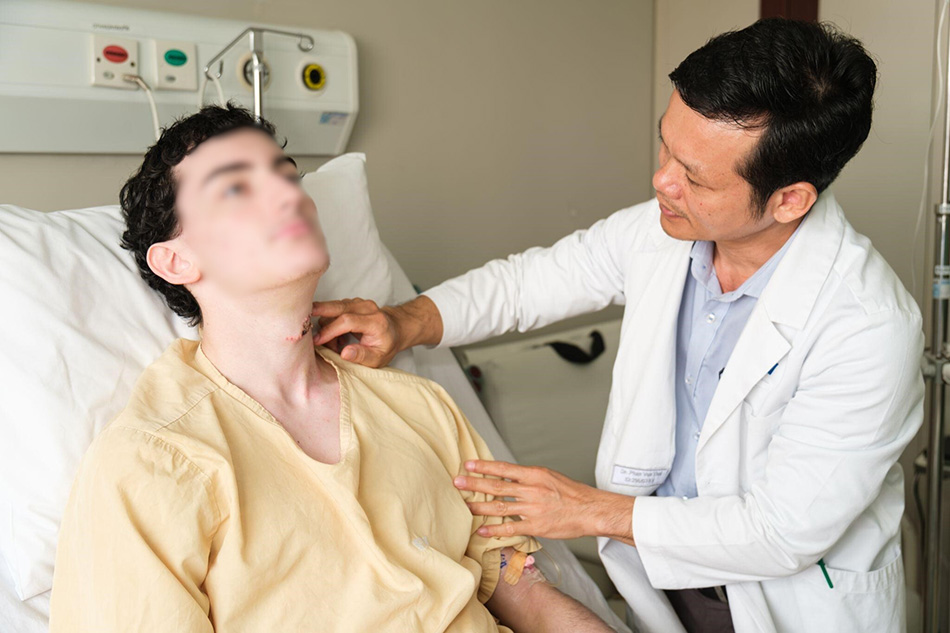After falling from his bicycle and being impaled in the neck by the handlebars, 17-year-old patient K, an American residing in Ho Chi Minh City, was rushed to FV Hospital with severe blood loss and visual disturbance. The hospital urgently mobilised four specialist departments to save his life in time.

Patient K shakes the hand of Dr Phan Van Thai, Specialist Level II, before being discharged.
An unexpected accident occurred on the way to school.
While riding his bicycle to school on a February morning, K suddenly lost control and fell off the road to avoid an obstacle. During the unexpected fall, the handlebars struck his neck, resulting in a deep wound. Blood gushed from his throat, making it difficult for K to breathe and causing him to feel dizzy. He quickly used his hand to cover the wound and staggered home on foot.
Upon seeing his son covered in blood at the door, patient K’s father hastily took him to the nearby hospital for emergency treatment. “The moment I saw my son injured like that, I panicked and only knew how to quickly get him to the nearest medical facility,” K’s father recalled.
Recognising the severity of the accident, doctors at the local hospital promptly administered first aid, inserted an endotracheal tube, and then transferred the patient to FV Hospital.
Multiple specialties collaborated in this emergency impaling case.
Upon receiving the phone call from the initial emergency medical unit, FV Hospital immediately activated a code red alert, mobilising forces from various specialties to be ready to respond to the patient.
Dr Ha Thi Hanh, from FV Hospital’s Accident & Emergency Department, recalled: “When the patient was transferred to FV Hospital, he was restless, agitated, disoriented, with a blood pressure of 46/20 mmHg, indicative of haemorrhagic shock. His neck was temporarily compressed with a bleeding control bandage, but blood continued to ooze from his nose and throat.”
Witnessing their son in a state of visual disturbance and relentless agitation, his family feared he might not survive. K was immediately administered fluids, received a blood transfusion, vasoactive medications and a CT scan. Concurrently, doctors prepared for immediate surgery.
Due to the complexity of the situation and the patient’s critical condition, the medical board at FV Hospital urgently convened and agreed upon a surgical team comprising physicians from General Surgery; Thoracic, Vascular & Endovascular Surgery; Otorhinolaryngology; Gastroenterology & Hepatology; and Anaesthesiology & ICU. Among them, Dr Phan Van Thai, Specialist Level II, Head of the General Surgery Department, was lead surgeon.

Dr Phan Van Thai, Specialist Level II, explained the patient’s traumatic condition.
“The patient’s injury was extremely dangerous, with a wide skin laceration extending from the front of his neck, penetrating deeply into the front of the cervical spine, while also transversely piercing the carotid sheath area, where many blood vessels and important nerves converge.
“His handlebars had torn through the lower part of the pharynx-oesophagus, spanning a length of approximately four centimetres. Blood from the wound has spilled into the pharynx-oesophagus laceration, with a portion aspirated into the lungs and the rest swallowed into the stomach and discharged from the nose and throat.”

Doctors at FV Hospital perform the life-saving surgery.
Due to significant blood loss, the patient received a transfusion of 1,500 ml of blood during the surgery. Surgical procedures were performed meticulously with the assistance of endoscopic guidance from the Otolaryngology and Gastroenterology departments so that injuries in the nasal, pharyngeal, and oesophageal areas could be explore and evaluated.
“Thanks to endoscopic assistance, the surgical team were able to accurately assess the external wounds and gain a clear view of the internal injuries in the pharyngeal-oesophageal area, thereby helping them to ensure all the damage was repaired and all wounds could be precisely closed,” explained Dr Phan Van Thai.
After two hours, the doors of the operating room opened, and patient K’s family rejoiced as Dr Thai informed them that their son’s wounds had been well managed, his swallowing function had been restored to normal, and that he had been transferred to the ICU for observation.

Dr Phan Van Thai examined patient K’s surgical incisions after the operation
The patient recovered well within one week of the accident.
Thanks to the preparedness of the emergency response team from multiple specialties, the complex surgery yielded excellent results. Coupled with meticulous post-operative care, the patient was discharged just one week later.
Patient K’s father breathed a sigh of relief as he was notified of his son’s discharge. He had been worried sick witnessing his son’s struggles to breathe en route to the emergency room. His worries were eased slightly once his son had undergone a successful surgery, however, he still spent sleepless nights waiting outside the ICU after the operation.
He was overjoyed when his 17-year-old boy was taken off a ventilator and transferred to the special care unit to recover, day by day. Patient K’s father mentioned that he himself had been a patient at FV Hospital, so he had full trust in the hospital’s team of doctors. He felt validated in his decision to continue trusting FV for his son’s treatment after this unusual accident.
Before being discharged, patient K smiled brightly as he tightly held the hand of Dr Phan Van Thai, filled with gratitude.
“Dr Thai is very dedicated and skilful; he has taken excellent care of me. I am very grateful,” patient K expressed, emotionally.



